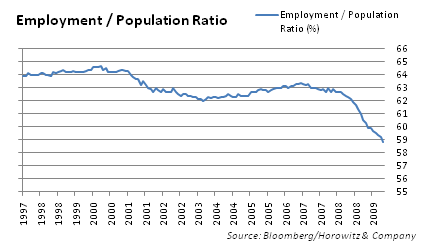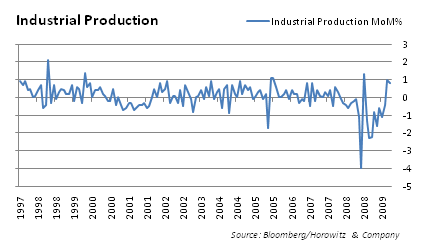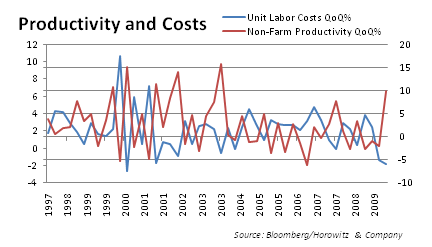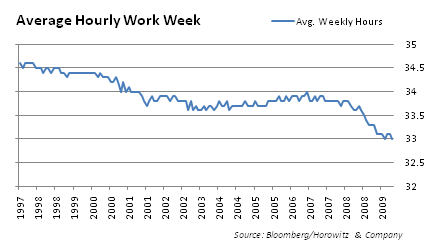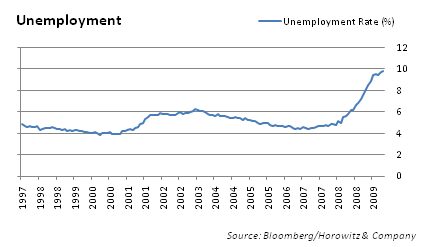We have discussed this a idea few times before and now we are seeing the “wisdom” of corporate America’s decision to cut one of the greatest expenses in order to bolster the bottom line. Yes, employees are apparently easily expendable in a time of negative revenue growth.
As management is consumed with meeting and beating on a quarterly basis, each employee that is laid-off represents a small benefit to the bottom line. Between salaries, benefits and other costs, cutting thousands of jobs has added another creative way to provide investors with upside EPS surprises in this difficult economic environment.
Short-sighted? Perhaps, but anything less could mean that a company may see their stock price plummet and that is not in the best interest of shareholders. Taken one step further we need to remember that management often holds a large position in their company’s stock – therefore; what is good for shareholders must be good for them as well. Right?
The real question is:
How long will can they keep cutting until it effects their revenue to a point that it also destroys profits?
While we all cheer the global market’s recovery, there is a significant impact on the lifestyles of many people who are suffering. NO, this is not a whiny rant of a socialist. Rather, it is a wake up call to remember that our economy is fragile and the imbalances that we are confronting are creating a gaping separation between the real economy and the market economy.
Consumption Cannibalism – Rise of the Machines
(Adapted from our latest Economic Commentary)
We are all keenly aware that consumers are deeply entrenched and have yet to recommence spending as mending their own balance sheets has assumed a higher priority considering a 40% decline in investment portfolios during 2008. Between PSSDD (Post Traumatic Stock Decline Disorder) and uncertainty about the future, this is a very understandable reaction.
Sure, many have recouped a portion of the losses but the steep rise off a bottom for consumer confidence was short lived as employers continue to cut jobs and other expenses. Again, this provides massive relief to corporations in order to meet even the lowest earnings and revenues expectations analysts are predicting.
The mass layoffs we have seen show that humans are expendable in the “New Normal” as companies believe that the bottom line is more important. This of course is logical in a world that rewards short term performance to management for meeting or beating analyst‘s expectations. In turn, this leads to the inevitable problem that will create, what we call, Consumption Cannibalism.
Here is how it works:
Companies panic as sales and/or manufacturing significantly slows. In order to protect the bottom line there are several options to cut expenses. Management may choose to increase reliance on technology to tweak the business process. Or they may even renegotiate with the supply chain to reduce costs and/or discontinue purchases altogether to drain current inventory until demand returns.
Under most circumstances (especially during a short and shallow recession) this will work adequately. Often this will provide companies enough time to allow growth and manufacturing to commence as consumer demand resurfaces. Under this scenario, the slowdown is usually temporary as consumers have only slowed/postponed purchases rather than cutting them altogether.
Beyond simple cost cutting, when a recession deepens, employees need to be cut as less work is required and management is unsure of when demand will return. Add to the equation an economy that essentially stopped in its tracks during the 4th quarter of 2008. At that time, demand essentially dried up at a time that there was little clarity about the future. Management began to realize that the only way to stabilize their business was to cut as many employees as possible (the most costly aspect for many companies). With this decision is the understanding that each employee needs to output more in an effort to meet demand. In fact, this was by far the overwhelming reason earnings came in anywhere near estimates during the first and second quarters of 2009.
Many companies have pushed the limits of technology to take the place of the costly human. THAT is why many economists are calling a 7-9% unemployment rate the “New Normal” and something we should expect for many years to come. Unfortunately, technology does not need food, clothing and/or shelter. In other words, technology does not consume, so the very idea of cutting employees at this level could potentially deepen the recession.
Management is effectively cannibalizing consumption in an effort to limit losses and create the perception of short-term profits. Yet, the greater the unemployment, the more the savings rate will rise. Consumer sentiment will continue to wane resulting in a further drop in consumption….and the cycle continues.
By the time management begins to awaken to the fact that they have no more cuts available it will probably be one to two quarters later. It is sad to say (but true) that benefiting the bottom line is all that is seen as important in an economy which is so desirous of instant gratification. Eventually consumption will push down profits with little way for companies to cut expenses further in an environment of falling revenues. The end result will be that consumption remains anemic and unemployment will eclipse 10% by the end of 2009.
During this cycle, companies will be more cost efficient and will leaner. Profits will rise while revenues stagnate. So it seems that the higher the unemployment rate, the better for stocks. Now, doesn’t that make sense?
___
Disclosure: Horowitz & Company clients may hold positions of securities mentioned as of the date published.


